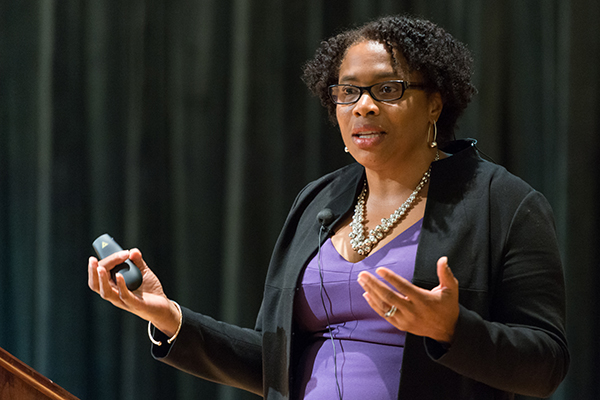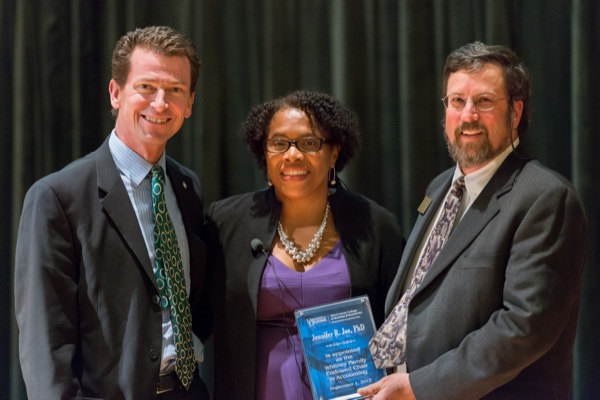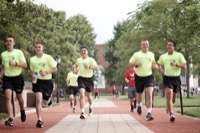


Exploring auditor bias
Lerner's Jennifer Joe delivers inaugural Whitney Family Lecture
10:03 a.m., Nov. 1, 2013--Much academic research in accounting aims to explain, predict or describe how management and other market participants use and respond to accounting information and systems. But what if that research could be used to improve the value of the audit function in financial reporting?
That’s where Jennifer Joe, the newly appointed Whitney Family Endowed Chair in Accounting and professor, comes in. Her research explores how the information context can influence the behavior and decision making of market participants like auditors and investors.
People Stories
'Resilience Engineering'
Reviresco June run
“Previous research has observed that clients who are covered negatively in the press are more likely to receive a going-concern opinion even though press coverage didn’t increase the client’s bankruptcy risk,” said Joe. The result is that auditors have often been perceived as making a deliberate or defensive decision to issue going-concern opinions to reduce their litigation.
In 2003, Joe challenged that view, arguing that the auditors’ opinion decision was not deliberate or strategic and instead that auditors were subject to a cognitive bias.
“Auditors, like most individuals, tend to judge the likelihood of an event by attributes that are representative of that event,” said Joe.
Her research found that auditors do not deliberately favor conservative decisions in response to negative media attention but rather submit to cognitive bias.
Joe fielded questions from audience members throughout the program, including those from skeptics.
Asked one attendee, “How can an external auditor be independent yet biased?”
According to Joe, the anomaly occurs because auditors are often put in the “second mover position” in which they have to make an independent judgment after seeing management’s judgment – and management’s information can be biased or incorrect.
“The preparation of audit information is independent but the response to that information is subject to subconscious cognitive biases that can lead to flawed judgment,” she explained.
For Joe, a key question is whether auditor-provided consulting services can improve or diminish the quality of an audit.
“The task of an audit is to assess misstatement risk, fraud risk and to identify control deficiencies,” said Joe. “The findings show that consulting can help auditors identify reporting risks but inhibit their fraud risk and control risk assessments.”
But the findings also motivate Joe to continue her research; while an auditor’s task may be done, Joe’s work as a scholar never stops.
About the Whitney Family Lecture
Joe, whose position is funded through generous support from Kenneth C. and Elizabeth K. Whitney, is the first for the Department of Accounting and MIS intended to support a talented scholar in the field of accounting.
The lecture, which was held on the University of Delaware’s Newark campus last week, gave Joe an opportunity to introduce her research to the campus and local community and share her impact on the field, said Scott Jones, chair of the department.
“Professor Joe is one of the most respected researchers in audit judgment and decision making, and her contributions appear in the field’s most prestigious journals,” said Jones. “We are grateful to the Whitney Family for creating the opportunity for us to attract a scholar of Professor Joe’s caliber.”
Bruce Weber, dean of the Alfred Lerner College of Business and Economics, agreed that having a scholar of Joe’s caliber is essential to examining how auditors make critical decisions in reporting financial results to the capital markets.
“The market value of U.S. public companies is roughly $20 trillion, and investors rely on audited disclosures to be informed and confident,” said Weber. “Jennifer’s results are important and impactful and her scholarship will benefit students and professionals alike.”
Joe’s research on auditing, audit quality and auditors’ judgments has led to publications in the leading journals in the field including The Accounting Review and the Journal of Accounting Research.
Her secondary research interests are based on the use of archival data where she uses proprietary data to examine factors associated with auditors’ decisions to waive proposed audit adjustments and public data to examine the impact of press coverage on investors’ trading decisions.
Both Jones and Weber attributed Joe’s role on campus to the generosity of the Whitney Family.
“For many years, the department faculty have pursued a mission of training the next generation of accounting professionals and expanding knowledge to improve professional practices,” said Weber. “Today, the department and Scott Jones have moved to the next level by welcoming the group’s endowed chaired faculty member to the Lerner College and UD communities.”
Article by Kathryn Meier
Photos by Evan Krape









